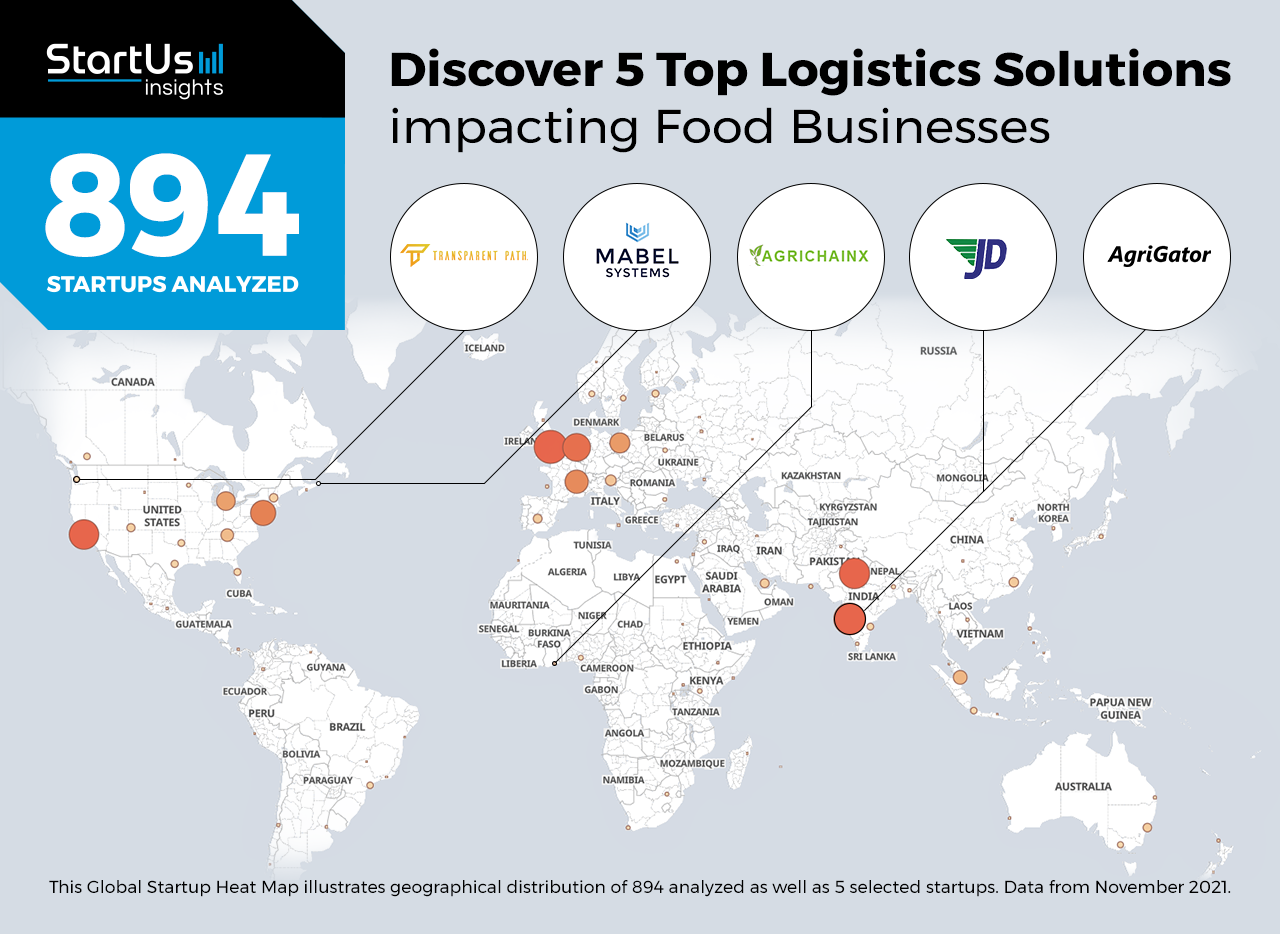Staying ahead of the technology curve means strengthening your competitive advantage. That is why we give you data-driven innovation insights into the food industry. This time, you get to discover 5 hand-picked startups developing logistics solutions for food businesses.
Out of 894, the Global Startup Heat Map highlights 5 Top Logistics Solutions impacting Food Businesses
The insights of this data-driven analysis are derived from the Big Data & Artificial Intelligence-powered StartUs Insights Discovery Platform, covering 2 093 000+ startups & scaleups globally. The platform gives you an exhaustive overview of emerging technologies & relevant startups within a specific field in just a few clicks.
The Global Startup Heat Map below reveals the distribution of the 894 exemplary startups & scaleups we analyzed for this research. Further, it highlights 5 startups that we hand-picked based on criteria such as founding year, location, funding raised, and more. You get to explore the solutions of these 5 startups & scaleups in this report. For insights on the other 889 logistics solutions for food businesses, get in touch.
Mabel Systems facilitates Food Inventory Management
Food companies face challenges in managing huge inventories manually. Also, traditional means for inventory management are inefficient and are prone to errors. Therefore, startups develop solutions, like robotic process automation (RPA), to automate repetitive inventory management processes such as data entry and data processing. This also allows managers to optimize the process and track their products in real-time.
Canadian startup Mabel Systems tracks food inventory. The startup uses computer vision to ensure that inventory data is flawlessly recorded without tedious data entry. The technology enables food processors to track the product at every stage by scanning it, from raw material to delivery. Mabelsystems’ software also provides dashboards that notify users about the product status in real-time, such as expiration dates and location information.
Just Deliveries provides a Food Delivery Network
Last-mile delivery in the food industry is increasingly critical in the food sector since the products are often quickly perishable. Moreover, existing food logistics systems are inefficient and also unhygienic. Every brand uses personal vehicles to deliver goods to retail stores, which also increases traffic congestion and fuel consumption. To mitigate these issues, startups provide shared food transportation services that allow companies to reduce logistics costs and swiftly deliver products.
Indian startup JustDeliveries creates a network of shared vans for the food and beverage industry. The startup allows restaurants chains and food stores to book vehicles to transport temperature-sensitive and fragile food items. In addition, the solution features a vehicle tracking system that provides real-time location updates to ensure timely delivery. Further, the startup provides strict quality controls and hygiene management to maintain food freshness and reduce food waste.
Transparent Path improves Food Supply Chain Visibility
For perishable food, it is important to report the product condition at every stage of the supply chain. Food logistics still relies on manual checks, paper records, and fax machines to report and communicate the food condition. These products are subjected to varied conditions like changing temperatures and humidity during transport but the product manufacturers remain unaware of this. To increase food chain transparency, startups use the internet of things (IoT) technology to monitor shipment conditions and share real-time data across the supply chain participants.
Transparent Path is a US-based startup that develops sensors to detect and communicate the food status in the food value chain. The startup’s printed sensor, ProofTags, is a biodegradable polymer label that is affixed to shipments. The sensors monitor the location, temperature, humidity, light, shock, and air pressure of the food shipments at every level, allowing receivers to understand the condition changes. Also, the startup’s Cold Chain Gateway sensor offers QR code guides for receivers to verify the authenticity of the arrived products and initiate returns.
AgriGator automates Grain Logistics Services
Agri-food suppliers encounter higher product charges and accidental losses due to the unorganized nature of the industry. Shippers are heavily dependent on transport options available on-spot for perishable products. Consequently, they end up paying a surplus amount due to the urgent requirement. On the other hand, carrier services raise prices due to the middlemen’s share which further increases the overall food price. That is why startups develop platforms to connect agri-shippers to verified truck carriers in real-time. Such solutions eliminate middlemen and optimize the cost for both agri-companies and logistics carriers.
Indian startup AgriGator connects grain shippers with independent truck carriers. The startup’s software allows shippers to choose carriers based on their availability and standard charges. It also allows participants to generate online invoices to maintain transparency as well as pay online. Additionally, the software enables shippers to track the parcel location regardless of the carrier services and provides demand forecasts for the carriers.
AgrichainX advances Supply Chain Digitization
Many counterfeit additions and financial fraud in the food supply are a result of insufficient data tracking in the supply chain. This causes huge financial losses to the food companies as well as to all other stakeholders. Therefore, startups use blockchain-based platforms to enable supply chain traceability. This allows participants to build secured connections and restrict the data accessibility to verified members and reduce fraud.
Nigerian startup AgrichainX develops a platform for food supply chain automation. The startup’s platform enables users to bid, arrange for transportation, and confirm product delivery. It also collects supply chain data and generates a distributed immutable ledger that allows members to track agricultural product data throughout the network and enables secured transactions in the agricultural ecosystem. These members include farmers, transporters, cold storage providers, retailers, and even consumers.
Discover more Food Tech Startups
Food startups such as the examples highlighted in this report focus on inventory management, supply chain traceability, cold chain monitoring, and food safety solutions. While all of these technologies play a major role in advancing the food industry, they only represent the tip of the iceberg. To explore more food technologies, simply get in touch to let us look into your areas of interest. For a more general overview, you can download our free FoodTech Innovation Report to save your time and improve strategic decision-making.



![Food and Beverage Industry: Top 10 Technology Trends [2025 & Beyond]](https://www.startus-insights.com/wp-content/uploads/2024/11/Food-and-Beverage-Industry-Trends-SharedImg-StartUs-Insights-noresize-420x236.webp)






